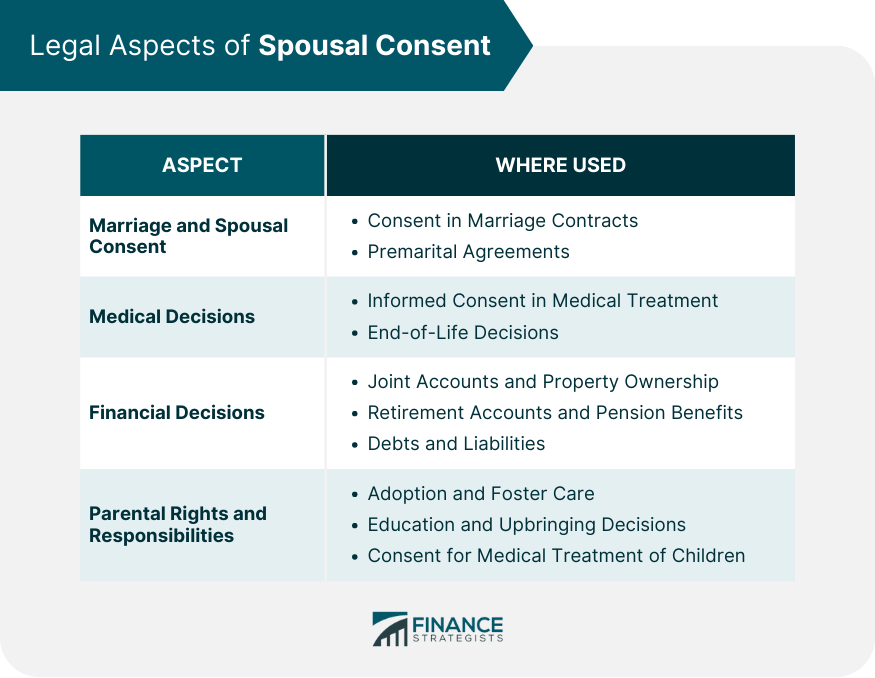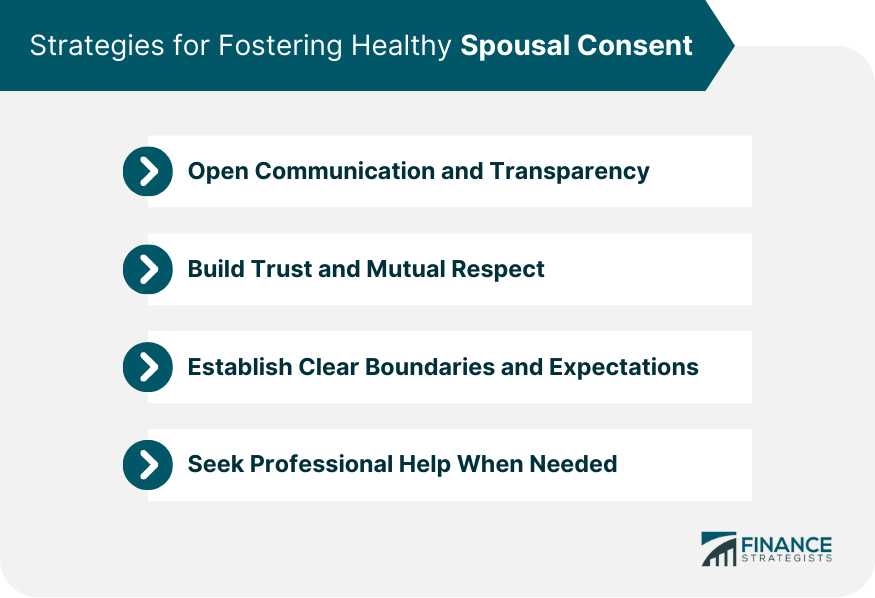Spousal consent refers to the voluntary agreement and active participation of one spouse in decisions or actions that may impact the couple or the marriage. It emphasizes the importance of mutual respect, communication, and shared decision-making within a relationship. Spousal consent is crucial in various aspects of life, including legal, financial, medical, and parental decisions. It ensures that both partners are actively involved in making choices that directly impact their lives, fostering a sense of mutual trust and respect. Historically, spousal consent has evolved alongside societal and cultural changes. In the past, women often had limited rights and were expected to defer to their husbands. However, with the growth of the feminist movement and an increased focus on gender equality, spousal consent has become an essential aspect of modern marriages. Consent is a fundamental aspect of marriage contracts, as both parties must willingly enter into the union. It is crucial for protecting individual rights and ensuring that both partners are committed to the partnership, thus creating a strong foundation for the marriage. Premarital agreements, also known as prenuptial agreements, require spousal consent to establish the terms and conditions of the marriage. These agreements can address issues such as property division, financial arrangements, and spousal support, ensuring that both parties are on the same page before entering into the marriage. Informed consent is necessary for any medical treatment, and when a spouse is unable to make decisions, spousal consent may be required. This consent ensures that both parties are aware of the potential risks and benefits and that the spouse can make informed decisions on behalf of their partner. Spousal consent is often needed when making end-of-life decisions, such as life support or palliative care. By involving the spouse in these difficult choices, the decision-making process becomes more collaborative, ensuring that both partners' wishes are considered. Spousal consent is necessary for opening joint bank accounts and acquiring property together. This ensures that both parties have equal access to and control over their shared assets, fostering a sense of financial partnership and responsibility. In many cases, spouses are required to consent to changes in retirement account beneficiaries or pension benefits. This requirement helps protect the interests of both partners and ensures that their financial futures are secure. Spousal consent is often needed when taking on shared debts or liabilities, such as mortgages or loans. By obtaining consent, both parties acknowledge their responsibility for the debt and are more likely to manage it effectively. Adoption and foster care decisions typically require spousal consent, ensuring that both partners are committed to the process and prepared for the responsibilities involved. This consent helps create a stable and supportive environment for the child. Spousal consent is important for making decisions related to a child's education and upbringing. By actively involving both parents in these choices, a more balanced and comprehensive approach to the child's development can be achieved. When it comes to medical treatment for children, spousal consent may be necessary to ensure that both parents are informed and in agreement with the proposed treatment plan. This consent fosters a sense of shared responsibility for the child's health and well-being. Within a marriage, individual autonomy and agency are essential for maintaining a healthy relationship. By respecting each other's independence, spouses can foster an environment where both partners feel empowered to make decisions and contribute to the relationship. Spousal consent is closely tied to equality and power dynamics within a marriage. By ensuring that both partners have an equal say in decisions, couples can avoid imbalances in power that may lead to resentment, conflict, or even abuse. Trust and communication are foundational to the concept of spousal consent. By fostering open and honest conversations, couples can better understand each other's perspectives, ultimately leading to more informed and mutually agreeable decisions. Cultural variations in attitudes toward spousal consent can impact the dynamics within a marriage. Understanding and respecting these differences is essential for navigating intercultural relationships and ensuring that both partners feel heard and respected. As societal views on marriage and gender roles have evolved, so too have perspectives on spousal consent. Recognizing the shift from traditional to modern views can help couples navigate changing expectations and foster healthier, more equitable relationships. Religion and social norms can significantly influence attitudes toward spousal consent. By acknowledging the role these factors play in shaping expectations within a marriage, couples can better understand each other's perspectives and work toward finding common ground. Forced marriages, in which one or both parties are coerced into the union, challenge the very concept of spousal consent. Addressing this issue requires ongoing advocacy and education to protect the rights and autonomy of individuals within a marriage. Disagreements over medical decisions can be particularly challenging, as they often involve deeply personal values and beliefs. In these situations, spousal consent can help ensure that both parties' perspectives are considered and that the best interests of the patient are prioritized. Financial disagreements within a marriage can strain relationships and undermine trust. By emphasizing the importance of spousal consent in financial decisions, couples can promote transparency, collaboration, and shared responsibility. Spousal consent can play a crucial role in preventing and addressing domestic violence and abuse. By promoting a culture of consent and mutual respect within a marriage, couples can create a safer and more supportive environment. Fostering open communication and transparency within marriage is essential for promoting healthy spousal consent. By creating an environment where both partners feel comfortable expressing their thoughts and concerns, couples can make more informed decisions together. Trust and mutual respect are foundational to healthy spousal consent. By consistently demonstrating these qualities within a marriage, couples can create a strong foundation for collaboration and shared decision-making. Setting clear boundaries and expectations within a marriage can help prevent misunderstandings and promote healthy spousal consent. By discussing and agreeing upon these expectations, couples can avoid potential conflicts and ensure that both partners feel respected and valued. In some cases, couples may benefit from seeking professional help, such as therapy or mediation, to address challenges related to spousal consent. These resources can provide guidance and support to help couples navigate difficult situations and build stronger, more resilient relationships. Spousal consent has evolved alongside societal changes and shifting perspectives on marriage and gender roles. As modern society continues to progress, the importance of spousal consent in fostering healthy, equitable relationships cannot be overstated. Striking a balance between individual autonomy and collective decision-making is essential for maintaining a strong marriage. By emphasizing spousal consent, couples can ensure that both partners have an equal say in decisions that impact their lives, fostering a sense of unity and partnership. Promoting a culture of consent, respect, and communication within a marriage is crucial for nurturing healthy relationships. By fostering these values, couples can create an environment where both partners feel heard, respected, and empowered to contribute to the relationship. In light of the importance of spousal consent in financial matters, couples may benefit from seeking the guidance of a financial advisor. A professional advisor can help navigate complex financial decisions and ensure that both partners are on the same page, ultimately promoting a stronger, more financially secure partnership.What Is Spousal Consent?
Legal Aspects of Spousal Consent

Marriage and Spousal Consent
Consent in Marriage Contracts
Premarital Agreements
Medical Decisions
Informed Consent in Medical Treatment
End-of-Life Decisions
Financial Decisions
Joint Accounts and Property Ownership
Retirement Accounts and Pension Benefits
Debts and Liabilities
Parental Rights and Responsibilities
Adoption and Foster Care
Education and Upbringing Decisions
Consent for Medical Treatment of Children
Ethical Considerations on Spousal Content
Autonomy and Agency Within a Marriage
Equality and Power Dynamics
Role of Trust and Communication
Cultural Perspectives on Spousal Consent
Variations Across Cultures
Traditional Versus Modern Views
Impact of Religion and Social Norms
Controversies and Challenges on Spousal Content
Forced Marriage and Consent
Disputes Over Medical Decisions
Financial Disagreements
Intersection With Domestic Violence and Abuse
Strategies for Fostering Healthy Spousal Consent

Open Communication and Transparency
Building Trust and Mutual Respect
Establishing Clear Boundaries and Expectations
Seeking Professional Help When Needed
Final Thoughts
Spousal Consent FAQs
Spousal consent is essential in a marriage because it promotes mutual respect, communication, and shared decision-making. By ensuring both partners have an equal say in decisions that affect their lives, you can foster a sense of trust and partnership within the relationship.
Spousal consent plays a significant role in financial decisions within a marriage. It ensures that both partners are involved in decisions related to joint accounts, property ownership, retirement accounts, and debts, promoting transparency, collaboration, and shared responsibility.
Spousal consent is important in medical decision-making because it ensures that both partners are informed and in agreement with the proposed treatment plan. This is particularly crucial when one spouse is unable to make decisions for themselves, allowing the other spouse to make informed decisions on their behalf.
To promote healthy spousal consent in your relationship, focus on open communication, trust, and mutual respect. Establish clear boundaries and expectations, and seek professional help, such as therapy or mediation, when needed to address challenges related to spousal consent.
Cultural and religious factors can significantly impact attitudes toward spousal consent. Understanding and respecting these differences is essential for navigating intercultural relationships and ensuring that both partners feel heard and respected within the context of their unique cultural and religious backgrounds.
True Tamplin is a published author, public speaker, CEO of UpDigital, and founder of Finance Strategists.
True is a Certified Educator in Personal Finance (CEPF®), author of The Handy Financial Ratios Guide, a member of the Society for Advancing Business Editing and Writing, contributes to his financial education site, Finance Strategists, and has spoken to various financial communities such as the CFA Institute, as well as university students like his Alma mater, Biola University, where he received a bachelor of science in business and data analytics.
To learn more about True, visit his personal website or view his author profiles on Amazon, Nasdaq and Forbes.











